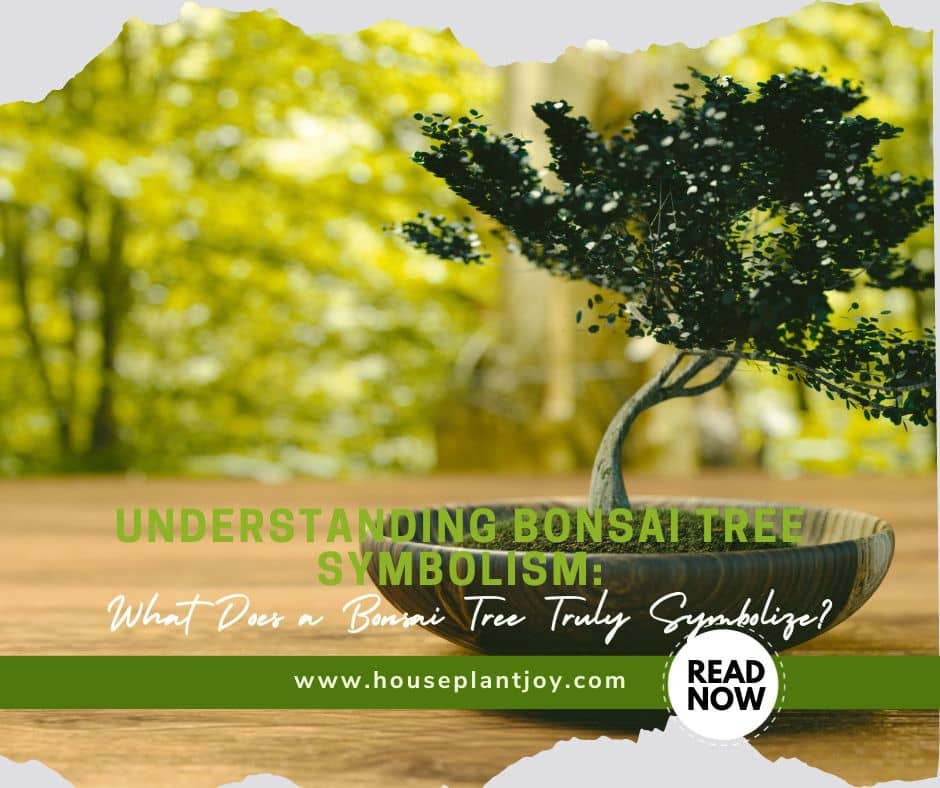HousePlantJoy is supported by our audience. When you purchase through one of our links, we may earn a small affiliate commission. As an Amazon Associate I earn from qualifying purchases. Your cost is not affected.
==================
Bonsai Tree Symbolism
The art of Bonsai is a delicate practice that marries horticulture and aesthetics in a unique fusion. ‘Bonsai,’ which translates to ‘planted in a container,’ is more than growing miniature trees. It is a profound and intricate form of art that requires patience, dedication, and a deep understanding of nature. But the question that often arises is – what does a bonsai tree symbolize?
The symbolism behind a bonsai tree is as intricate as the art itself. It reflects the artist’s connection with nature and their understanding of the world. The practice of bonsai is a way to seek balance and harmony, create a sense of peace and tranquility, and mirror nature’s grandeur on a miniature scale.
Bonsai is about capturing the essence of nature in a small pot, creating a universe in miniature, and telling a story through its form. As such, the symbolism of a bonsai tree varies, reflecting different cultures, philosophies, and personal interpretations.
Source: Bonsai Alchemist
The History of Bonsai Trees and Their Meanings
The art of bonsai originated in China over a thousand years ago, where it was known as ‘penjing.’ The Chinese created miniature landscapes in pots, using rocks, water, and trees to replicate nature’s grandeur. The practice had profound spiritual and philosophical implications, symbolizing the Chinese belief in the unity and harmony of heaven (sky), earth (land), and man (humanity).
The practice later spread to Japan, where it evolved into what we know today as Bonsai. The Japanese interpretation of bonsai, heavily influenced by Zen Buddhism, emphasized simplicity, austerity, and an appreciation of nature’s subtle and profound beau. The bonsai tree’s significance in Japanese culture is often linked to the concepts of patience, contentment, and the appreciation of the beauty in small, simple things.
The symbolism and meaning of bonsai trees have evolved over time and across cultures, reflecting changing philosophies, beliefs, and artistic trends. However, the core essence of bonsai remains the same, symbolizing a deep respect for nature and a commitment to harmony, balance, and inner peace.
What Does a Bonsai Tree Symbolize in Different Cultures?
Bonsai symbolism varies across cultures, reflecting philosophies, beliefs, and aesthetic ideals. In Chinese culture, bonsai trees symbolize eternity and longevity, reflecting the Taoist belief in the soul’s immortalityreflect. The trees’ miniature size and the artist’s careful pruning and shaping are seen as a reflection of the Taoist quest for simplicity, harmony, and balance.
In Japanese culture, the bonsai tree’s spiritual meaning is closely tied to Zen Buddhism. The tree symbolizes the Buddhist principles of simplicity, naturalness, and the beauty of imperfection. Caring for a bonsai tree is seen as a form of meditation, cultivating mindfulness, patience, and an appreciation of the present moment.
In Western culture, the bonsai tree has been interpreted as a symbol of strength, resilience, and the power of nature. The tree’s ability to survive and thrive in a small pot despite harsh conditions is seen as a testament to the strength and adaptability of nature and a metaphor for personal growth and resilience.
Bonsai Plant Meaning:
Digging Deeper into its Significance
The bonsai plant’s meaning goes beyond its physical appearance. It represents a living entity that grows and evolves, reflecting the artist’s journey and the changes in their life. The tree’s form, shape, and growth pattern can reveal a lot about the artist’s personality, experiences, and worldview.
The act of caring for a bonsai tree is a form of self-expression and self-exploration. It is a way to communicate with nature, learn from it, and reflect on osymbolizesCaring existence. The tree’s growth and development mirror our own journey, with its ups and downs, its periods of growth and stagnation, and its resilience in the face of adversity.
The bonsai tree’s significance extends to the spiritual realm. It is a symbol of the unity of heaven, earth, and man, reflecting the interconnectedness of all things in the universe. The tree’s roots, trunk, and branches symbolize different aspects of life and the universe, representing the cycle of life, the flow of energy, and the balance of yin and yang.
Bonsai Tree Spiritual Meaning
The bonsai tree’s spiritual meaning is deeply rooted in the principles of Buddhism and Taoism. The tree represents the eternal cycle of life, death, and rebirth, symbolizing all things’ impermanence and the universe’s constant change. The tree’s miniature size and the artist’s careful shaping and pruning reflect the Buddhist teachings on simplicity, mindfulness, and the beauty of imperfection.
The tree’s roots, which anchor it to the earth, symbolize our connection to the physical world and our grounding in reality. The trunk, which supports the tree, represents our strength, resilience, and inner spirit. The branches, which reach towards the sky, symbolize our aspirations, dreams, and spiritual growth.
Caring for a bonsai tree is a form of meditation, a way to cultivate mindfulness and awareness. It is a practice that requires patience, dedication, and a deep understanding of nature, mirroring the Buddhist path toward enlightenment.
What Do Bonsai Trees Symbolize:
Understanding the Symbolism
Bonsai trees symbolize a multitude of things. They represent the unity of heaven, earth, and man, reflecting the interconnectedness of all things in the universe. They represent the eternal cycle of life, death, and rebirth, mirroring the impermanence of all things. They represent simplicity, naturalness, and the beauty of imperfection, embodying the principles of Zen Buddhism.
Bonsai trees also symbolize strength, resilience, and the power of nature. They represent the artist’s journey, connection with nature, and personal growth and self-discovery from caring for a bonsai tree.
Bonsai trees symbolize nature’s harmony and balance, the universe’s beauty and mystery, and the deep spiritual connection between humanity and the natural world.
Bonsai Tree Symbolism: Its Representation
in Art and Literature
Bonsai tree symbolism is prevalent in art and literature, reflecting the tree’s significance in different cultures and philosophies. In Chinese and Japanese art, bonsai trees are often depicted as symbols of harmony, balance, and the unity of heaven, earth, and man.
In literature, bonsai trees are often used as metaphors for human life, growth, and self-discovery. They symbolize life’s journe, with its ups and downs, its periods of growth and stagnation, and its resilience in the face of adversity.
In modern popular culture, bonsai trees have been used as symbols of peace, tranquility, and the power of nature. They represent a retreat from the hustle and bustle of modern life, a return to nature, and a commitment to living in harmony with the natural world.
Bonsai Meaning: How it Influences Modern Practices
The bonsai meaning profoundly influences modern practices, especially mindfulness, meditation, and personal growth. Caring for a bonsai tree is seen as a form of meditation, cultivating mindfulness, and connectin with nature.
The tree’s symbolism is often used in personal growth and self-help literature, representing the journey of self-discovery, the pursuit of balance and harmony, and resilience in the face of adversity.
Bonsai trees are used in interior design for their aesthetic appeal and symbolic meanings. They are seen as a way to bring nature indoors, create peace and tranquility, and promote harmony and balance.
What Does a Bonsai Tree Represent:
Personal Interpretations and Experiences
The question – what does a bonsai tree represent – has yet to have a definitive answer. The tree’s symbolism is as varied and unique as the individuals who practice the art of bonsai.
For some, the bonsai tree represents a connection with nature, a reminder of the beauty and mystery of the natural world. For others, it symbolizes personal growth, resilience, and the journey of self-discovery.
Caring for a bonsai tree can be a deeply personal and transformative experience, a way to cultivate patience, mindfulness, and a deep appreciation for the present moment. It can be a form of self-expression, a way to communicate with the world, and a means to explore and understand oneself.
Once more, we recommend these products to both novice bonsai enthusiasts and experienced experts. #ad
Bonsai Tree Meaning in Our Lives
In conclusion, the bonsai tree meaning is a profound and multifaceted concept that reflects different cultures, philosophies, and personal interpretations. The tree symbolizes the unity and harmony of nature, the cycle of life, and the deep spiritual connection between humanity and the natural world.
The practice of bonsai is a way to connect with nature, cultivate mindfulness and patience, and embark on a journey of self-discovery and personal growth. Whether a hobby or a way of life, bonsai offers a unique and enriching experience that fosters a deep appreciation for the beauty and mystery of the natural world.
So, the next time you come across a bonsai tree, take a moment to ponder – what does this bonsai tree symbolize for me? You might be surprised at the depth and complexity of the answers you find.
FAQs
What is the symbolism behind the harmony of a Bonsai tree?
By carefully manipulating limbs, leaves, and branches, you can grow a Bonsai tree that is a testament to life at any cycle. In the Bonsai pot, the grower can celebrate the vitality of youth with slender trunks and reaching limbs—or meditate on the enduring beauty of old age with exposed roots and gnarled branches.
What is the symbolism behind the simplicity of a well-designed Bonsai tree?
The modest beauty of a well-designed Bonsai tree can be a contrast to our busy, complicated world. Caring for and admiring these tiny trees invites you to slow down and declutter your mind, and pushes you to consider how care and intention—not frills and excess—create a life worth bearing witness to.
What is the significance of Bonsai tree meanings?
Bonsai tree meanings are important when gifting a Bonsai tree to someone, as each species of Bonsai tree has its own symbolic meaning. Bonsai trees in general symbolize harmony, peace, balance, and all that is good in nature.
What is the meaning behind the Chinese word for Bonsai?
The Chinese word for Bonsai, “pun-sai” or “penjing,” translates to “landscape in a pot.” The word “pen” means pot, and “jing” means landscape. Bonsai trees are intended to be a miniature replication of nature confined in a pot, without clearly displaying human intervention in the process.
What is the significance of gifting a Bonsai tree?
Gifting a Bonsai tree can add an extra layer of thoughtfulness to your gesture, as each species of Bonsai tree has its own symbolic meaning. Understanding the significance of the tree you are gifting can make it a more meaningful and personalized gift.
What are some popular species of Bonsai trees and their symbolism?
Some popular species of Bonsai trees include the Jade, Ficus Retusa, and Chinese Elm. The Jade symbolizes abundance, the Ficus Retusa symbolizes love and fertility, and the Chinese Elm symbolizes harmony, intuition, wisdom, and strength.
?Unlock the profound world of Bonsai Tree Symbolism! ?
Delve into the ancient art of Bonsai, where every miniature tree tells a story of patience, resilience, and harmony with nature. ? Discover the meaning behind each meticulously pruned branch and carefully cultivated root, and let the symbolism of these tiny giants inspire you.
Join us on Facebook, Instagram, and Twitter for beautiful photos, plant care tips, and a community that celebrates the joy of indoor gardening.
Facebook: https://www.facebook.com/houseplantjoyblog
Instagram: http://instagram.com/houseplantjoy20
Twitter: https://twitter.com/HouseplantJoy
? Elevate your surroundings with the essence of tranquility and balance that Bonsai embodies. ?♂️ Embrace the art form that brings peace, focus, and mindfulness to your life. ? Join a community of enthusiasts who celebrate the beauty and wisdom of Bonsai Tree Symbolism.
Experience the world of Bonsai like never before. Start your journey today and let the miniature trees guide you towards a deeper understanding of life’s beauty. ?? #BonsaiSymbolism #InnerPeace #NatureInMiniature












